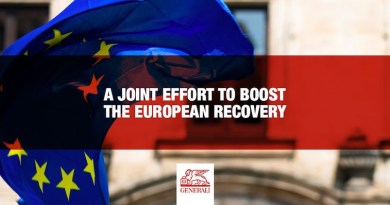
Sustainable Finance and the insurance sector: how Generali is integrating sustainability in its strategy
Generali is a major player in the global insurance industry – a strategic and highly important sector for the growth, development and welfare of modern societies. It is a sector that is called upon to manage and tackle global challenges on a daily basis and to deal with significant current issues such as climate change, changes to global demographic structures, and cybersecurity.
Within this context, we believe that sustainability must be integrated into our business in practical terms, enabling us to create long-term value while, at the same time, preserving the environment and acting for the common good. This is all the more evident for multinationals with a worldwide presence, such as Generali, since their impact and influence go beyond the perimeter of their stock capitalisation and short-term financial performance.
This long-term vision has led our Group to publicly adhere to voluntary agreements and initiatives such as the Global Compact (2007), the Principles for Responsible Investment (2011), the Principles for Sustainable Insurance (2014) and the Paris Pledge for Action (2015) and to support the Sustainable Development Goals (2015).
Generali’s purpose – “Enable people to shape a safer future by caring for their lives and dreams” refers to this vision.
Our role is about creating long-lasting value focusing on relevant megatrends that will shape the business and society, keeping into perspective the long-term impact on all our stakeholders: not only shareholders and clients, but also employees, distributors, suppliers, local communities, the environment, future generations and society at large.
Finance is an effective tool we can use to pursue our sustainability targets. With more than 500 billion euros of assets under management, we are one of the biggest institutional investors in the world and our financial standing is a powerful lever that has a significant impact on the real economy.
By choosing which asset classes to invest in, we can on one hand actively endorse virtuous sectors (e.g. the green economy), and on the other hand promote those industrial areas that drive economic growth and a wider distribution of the benefits of globalisation (i.e. infrastructure, real estate investments, etc.).
Moreover, investing in Government Bonds means supporting State Budgets, contributing to the development and stability of welfare.
For a number of years, we have been implementing the Responsible Investment Guideline, which filters our investments according to Sustainability criteria, also called ‘Environmental, Social and Governance’ (ESG) criteria: corruption, human rights violations, environmental damage, coal, specific weapons (cluster bombs, anti-personnel mines, nuclear weapons). This activity generates Restricted Lists and Watched Lists of issuers under review and it applies today to 289 billion euros. As part of our investment approach, we invest 33 billion euros in ‘best in class’ companies, selected according to positive criteria such as good governance, policy on diversity and inclusion, environmental protection: the so-called Socially Responsible Investing (SRI).
The recent acquisition of Sycomore, leading player in ESG/SRI investments in France, further shows our commitment to investment strategies driven by ESG criteria.
The challenge of climate change is a particularly pressing issue, in relation to which our Group is engaged in a series of initiatives some of which have been also be integrated in our new three-year strategy, Generali 2021.
The path we are following is clear: our goal is to increase our commitment towards sustainable and green sectors and divest from coal-related activities, taking concrete steps both in terms of investments and insurance. As far as the green and sustainable sectors are concerned, the Group is steadily increasing its efforts, with a target of 4,5 billion euros worth of investments, between infrastructure and green bonds, to be reached by 2021.
In terms of underwriting, we will further consolidate our already strong presence in the renewable energy sector, aiming for a 7-9% increase of premiums linked to insurance products with socio-environmental value.
Generali also intends to cease all coal-related activities. Aside from excluding any new investments in businesses associated with the coal sector, we are divesting our current portfolio’s 2 billion euros worth of carbon-related assets.
In terms of insurance, we have pledged not to increase the already minimal exposure to the coal sector, and we have also decided not to insure any new construction projects (power plants and coal mines) be they from new or existing customers as well as to divest from all Polish coal mines. In the Regions that are strongly coal-dependent, we are collaborating with coal counterparties to support transition to a low carbon economy by applying the principles of Just Transition promoted by The Grantham Research Institute in collaboration with the London School of Economics and Harvard University and in partnership with the UN-Principles for Responsible Investments (UN-PRI). This approach integrates the social impact of our decisions on local workers and on energy supply to communities into our Climate Strategy.
The latest initiative involves the issue of the first Generali green bond and the first for an insurance company in Europe
on 16 September, and at the same time the publication of a Green Bond Framework, which clearly defines the investment processes and areas for assets under management. Specifically, six categories of investable assets have been defined (green buildings, renewable energy, energy efficiency, clean transportation, sustainable water management, recycling, and re-use & waste management) and a selection and monitoring procedure assigned to a cross-functional committee within the Company (Generali’s Green Bond Committee).
In this context and in order to mainstream sustainability considerations, we believe that a certain level of regulation is necessary. We also fundamentally support the European Commission’s Action Plan on financing sustainable growth and have been actively engaged in discussions with stakeholders on this issue.
A meaningful yet practical framework to further the mainstreaming of sustainable finance is required in order to fulfil the sustainability objectives following the Paris Agreement.
Such a framework, which should be based on reliable data and ensure legal certainty, would provide the unique opportunity for Europe to develop a global benchmark for sustainable finance.
It is nevertheless indispensable to assess companies holistically and to focus on a forward-looking perspective in the analysis.
Finance was an extraordinary invention of the mercantile economies of the past, and it has contributed significantly to defining the society we know today.
We believe that managing it and directing it towards the common good is one of the great challenges of the start of the twenty-first century, a challenge that we cannot afford to lose and at the same time representing a vital opportunity for development and prosperity for all.
Generali Tower in CityLife, Milan. Designed by the architect Zaha Hadid, the Group headquarter is characterized by a high level of energy efficiency.




